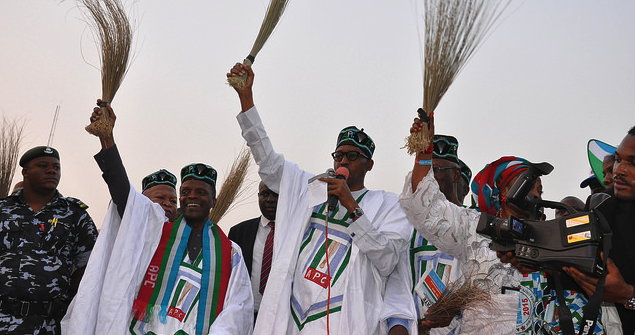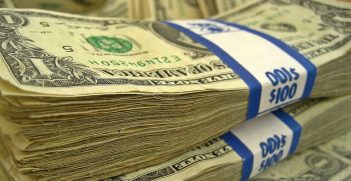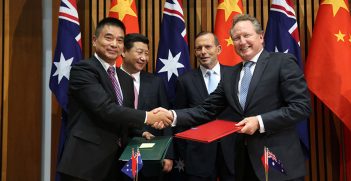Nigeria’s Election Crisis

Nigeria is the most populous nation in Africa, with a GNP larger than South Africa, yet it is facing an election that could threaten the very fabric of the state.
The northern half of Nigeria is largely Muslim, while the south is Christian and animist. Christian missionaries, excluded by the British colonial administration from most of northern Nigeria, brought Western education and conversion to the non-Muslim south, resulting in persistent educational and socio-economic disparities between the north and the south. The vast majority of Nigerians live in poverty, illiteracy is widespread, youth unemployment exceeds fifty per cent in many areas and infant mortality rates are worse than those in Afghanistan.
In addition, Nigeria is comprised of over 450 distinct ethno-linguistic groups. In an attempt to placate ethnic tensions, successive governments have created 36 states and 774 local government areas, based largely on ethnicity, but invariably with disaffected ethnic minorities. Moreover, population mobility since independence in 1960 has blurred religious and ethnic demarcations. Nevertheless, ‘non-indigenous’ Nigerians are disadvantaged outside their ethnic area, often with restricted access to land, education and government employment.
The 2015 election will be the fifth since the return to democratic government in 1999. Hitherto there has been a convention within the dominant People’s Democratic Party (PDP) that leadership should alternate between factions on the basis of ‘eat and give to your neighbour’. Fraud and corruption within practically every institution of state are rife, with billions earned from oil revenue fuelling the system.
President Goodluck Jonathan came to power promising to deal with corruption. When the respected governor of the Central Bank of Nigeria, Lamido Sanusi, a former World Bank deputy, tried to pursue $20bn missing from the accounts of the Nigerian National Petroleum Corporation, Jonathan sacked Sanusi.
The opposition All Progressive Congress (APC) is a coalition of diverse groups that claimed to be both progressive and determined to stamp out endemic corruption, but its reputation has been tarnished by the impeachment of several APC governors for corruption.
The most lucrative sectors of the domestic economy are based on rent-seeking government contracts, which, once paid, are rarely fully implemented. Thus whoever wins office at whatever level carries important consequences for influential elements of the economy, not merely politicians.
President Goodluck Jonathan, who is seeking an unprecedented second term, has postponed the February 2015 presidential, federal parliamentary, gubernatorial and state assembly elections for six weeks, citing insecurity caused by Boko Haram Islamic militants, who have seized control of widespread rural areas of northeast Nigeria. Opponents claim the ruling People’s Democratic Party is politically motivated; Jonathan and the PDP are using their control over the federal police, Department of State Security, army, federal bureaucracy and government media to thwart the electoral momentum of the rival APC and their presidential candidate, Mohammadu Buhari.
President Goodluck Jonathan is a Protestant Christian from the oil-producing Niger Delta, has closely identified with strident Nigerian evangelical preachers, led a Christian pilgrimage to Israel and used an audience with the Pope to appeal to Catholic Nigerians. The PDP has played upon the fears among Christians and those in southern Nigeria that an APC government would be dominated by Muslim northerners and have referred to the APC as “Nigeria’s Muslim Brotherhood”, claiming they have been secretly supporting Boko Haram militants. Since 1999, twelve northern states have introduced various forms of Sharia law, fuelling the paranoia of non-Muslims.
Many in Jonathan’s Niger Delta power base fear that bodies such as the Niger Delta Affairs Ministry (established in 2008 after the violently contested election of Pres Yar’Adua, a northerner), the Niger Delta Development Commission and the Presidential Amnesty Programme will be abolished. Under the Amnesty Program over $1.5bn has ostensibly been spent rehabilitating ex-militants from the Niger Delta, who carried out a protracted separatist rebellion against the former military government and Shell Oil. Most of the funds given to the Development Commission and the Amnesty Programme remain unaccounted for.
In 2014, Jonathan put the northeast states of Borno, Adamawa and Yobe under a state of emergency in the face of ongoing attacks and suicide bombings by the Islamic extremist Boko Haram sect, but has been inconsistent and ineffective in addressing the threat.
Muhammadu Buhari, a former military head of state (1983-85), has the backing of many northerners and Muslims. He has appealed to the broader electorate by pledging to bring discipline back into the army, defeat Boko Haram and bring peace to the country.
Firearms are readily available in Nigeria, many sold off by corrupt police and military officers, to the point where Boko Haram is often better armed than the Nigerian troops sent to fight them. In the Niger Delta, piracy and oil theft remain endemic. Nigeria has one of the highest rates of internal violence in the world. Hotheads in the various ethnic-political factions have threatened death and disorder if their side loses in the polls. There have already been numerous political assassinations. Boko Haram has vowed to disrupt the elections.
Under the Nigerian constitution a successful candidate must win at least 25 per cent of the votes in at least 24 of the 36 states. The northeast is ostensibly an APC stronghold, but if voting fails to take place across a significant number of constituencies and the presidential election is close, the outcome could be open to challenge, leading to a constitutional crisis.
Dr David Dorward is an honorary research associate at La Trobe University and the former director of La Trobe’s African Research Institute. This article can be republished with attribution under a Creative Commons Licence.




